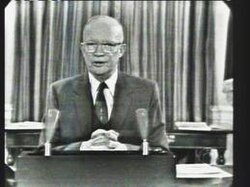On this day in 1961, outgoing president Dwight D. Eisenhower – ‘Ike’ – gave his famous farewell speech, warning Americans of the dangers of the ‘military-industrial complex – a phrase he coined. Ironic, as Eisenhower spent his life in the military, and was Supreme Allied Commander for the last half of the Second World War. Fresh from victory, he was elected to the White House in 1953, and, after two terms, departed in 1961, to be succeeded by the brief ‘Camelot’ era of John F. Kennedy.
Eisenhower warned Americans of the dangers of bankrupting the nation in the quest for military dominance, and the vast standing army – even then, in the millions – required to maintain global hegemony. More to the point, he warned of an over-reliance upon technology, and upon the experts who control said technology:
Akin to, and largely responsible for the sweeping changes in our industrial-military posture, has been the technological revolution during recent decades.
In this revolution, research has become central, it also becomes more formalized, complex, and costly. A steadily increasing share is conducted for, by, or at the direction of, the Federal government.…
The prospect of domination of the nation’s scholars by Federal employment, project allocation, and the power of money is ever present and is gravely to be regarded.
Yet in holding scientific discovery in respect, as we should, we must also be alert to the equal and opposite danger that public policy could itself become the captive of a scientific-technological elite
Yes, the emphasis is added, for we have not heeded his warning. The U.S. is at least $34 trillion in debt, and counting, such that the interest payments alone are bankrupting the nation. And the interventions in conflicts across the globe has had disastrous consequences, which we hope may be alleviated in this new presidency.
And what more need be said of becoming ‘captives of a scientific-technological elite’, in this age of internet censorship, universal surveillance, digital currency, dubious and dangerous global medical experimentation, if not outright malfeasance?
We should have listened to old Ike. He knew whereof he spoke. Perhaps we still can, at least those of us with eyes to see, and ears to hear.










